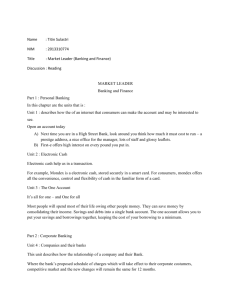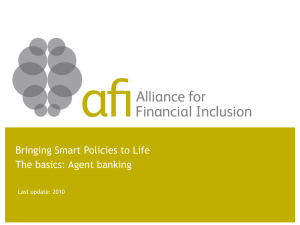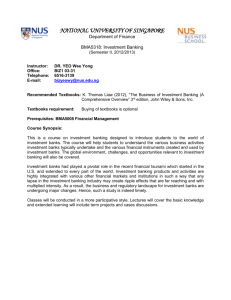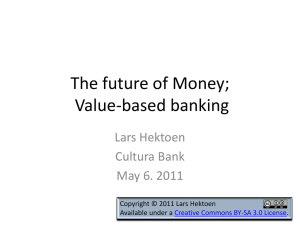Dear Sirs and PAs, Reason you may consinder the benefits for Peer
advertisement
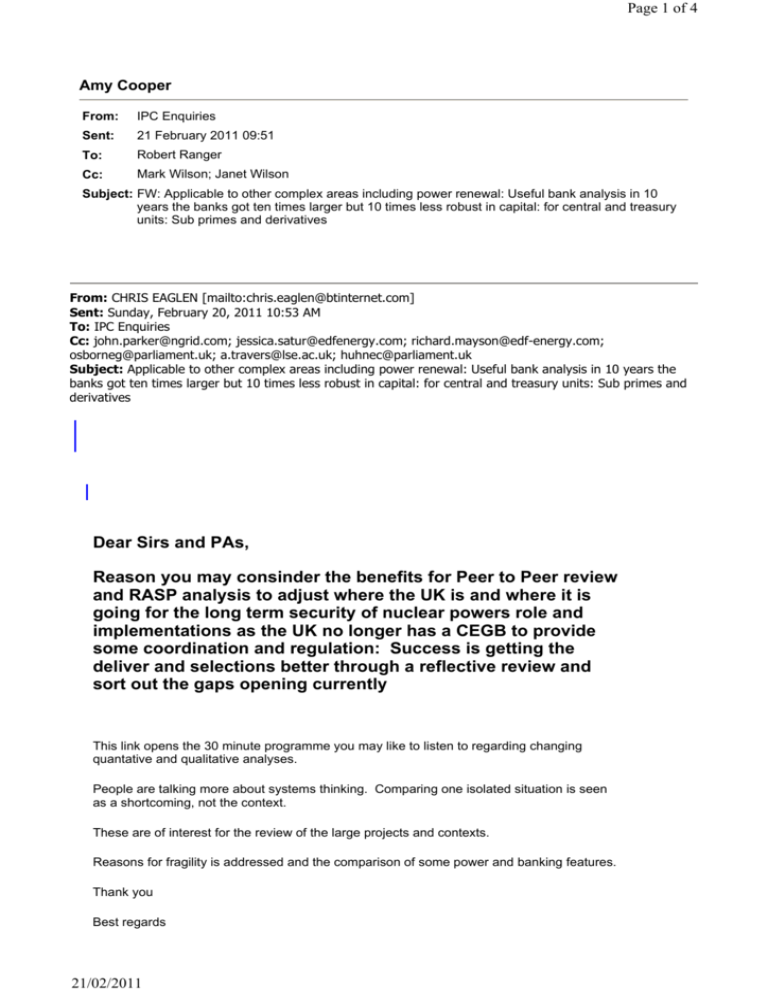
Page 1 of 4
Amy Cooper
From:
IPC Enquiries
Sent:
21 February 2011 09:51
To:
Robert Ranger
Cc:
Mark Wilson; Janet Wilson
Subject: FW: Applicable to other complex areas including power renewal: Useful bank analysis in 10
years the banks got ten times larger but 10 times less robust in capital: for central and treasury
units: Sub primes and derivatives
From: CHRIS EAGLEN [mailto:chris.eaglen@btinternet.com]
Sent: Sunday, February 20, 2011 10:53 AM
To: IPC Enquiries
Cc: john.parker@ngrid.com; jessica.satur@edfenergy.com; richard.mayson@edf-energy.com;
osborneg@parliament.uk; a.travers@lse.ac.uk; huhnec@parliament.uk
Subject: Applicable to other complex areas including power renewal: Useful bank analysis in 10 years the
banks got ten times larger but 10 times less robust in capital: for central and treasury units: Sub primes and
derivatives
Dear Sirs and PAs,
Reason you may consinder the benefits for Peer to Peer review
and RASP analysis to adjust where the UK is and where it is
going for the long term security of nuclear powers role and
implementations as the UK no longer has a CEGB to provide
some coordination and regulation: Success is getting the
deliver and selections better through a reflective review and
sort out the gaps opening currently
This link opens the 30 minute programme you may like to listen to regarding changing
quantative and qualitative analyses.
People are talking more about systems thinking. Comparing one isolated situation is seen
as a shortcoming, not the context.
These are of interest for the review of the large projects and contexts.
Reasons for fragility is addressed and the comparison of some power and banking features.
Thank you
Best regards
21/02/2011
Page 2 of 4
Chris Eaglen
BBC - BBC Radio 4 Programmes - Scientists of the Subprime
Ehsan Masood examines how science could help prevent future banking crises. ...
Available to listen. Last broadcast on Thursday, 21:00 on BBC Radio 4. ...
www.bbc.co.uk/programmes/b00yjs4m - Cached
►
BBC News - Can biology explain the global credit crunch?
17 Feb 2011 ... Economists are turning to science to find the best ways to ...
www.bbc.co.uk/news/business-12479998 - Cached
Scientists of the Subprime: Can
biologists avert another banking
crisis?
Biology is providing surprising insights into the financial crisis that brought the banking
system to its knees. A radio documentary presented by Ehsan Masood investigates
• Scientists of the Subprime will be broadcast at 9pm on Thursday 17 February on BBC
Radio 4
z
{
{
Share85
{
{
z
Comments (3)
Ecosystems
collapse when there is too little diversity and a high degree of connectedness between
species. Photograph: Mike Segar/Reuters
For the past few weeks I've been talking to biologists who are advising the Bank of England
21/02/2011
Page 3 of 4
on how to reform global finance, as part of a documentary for BBC Radio 4. I've been struck
by the ease with which biologists have been able to step outside their research field and
move confidently and assertively into another. But what exactly are they up to?
One of the causes of the financial crisis – and the haphazard international response to it –
was that regulators and governments lacked the tools to understand the banking system as
a whole. They knew what individual banks were doing, and they knew that these banks had
myriad links to other banks, but they couldn't tell with any certainty what this meant for the
banking system overall – until that is, it was much too late.
Making sense of the relationship between the individual and the system is one of science's
oldest challenges. What might be new to banking is well-studied in biology, for example.
This prompted Bob May, ecologist and former government chief scientific adviser, to
approach the governor of the Bank of England Mervyn King with an offer of help and advice.
Could there be, he wondered, any parallels between banking and ecosystems?
Drawing on their knowledge of the study of species and ecosystems, May and several
others including Andrew Haldane, the Bank of England's executive director for financial
security, constructed a model of the banking system. May has helped pioneer the idea that
the most stable ecosystems are those with a diversity of species. Less stable ecosystems
have less diversity and a higher degree of connectedness between species.
The banking model, which was published last month in the journal Nature, revealed a
system that was not only relatively homogeneous – lots of banks with similar characteristics,
doing the same things – but also super-connected. As with ecosystems, the model showed
that such a system was also vulnerable to shocks.
This finding is likely to add weight to a view already gaining ground in the Treasury that
there needs to be more diversity in banking and that the same institutions should not be
allowed to act as both retail banks and investment banks – in other words, less connectivity.
The biologists also applied their knowledge from a different field – infectious disease
epidemiology – to see if there are any lessons for finance. They found one that also has
implications for regulators.
In the event of a disease outbreak, organisations such as the World Health Organisation
quickly trace the biggest sources of infection. If it's a disease affecting humans, such as a
variety of flu, these "super-spreaders" need to be isolated from the rest of the population. In
the case of animal disease – such as foot and mouth – infected animals need to be culled.
Applying this analogy to banking threw up some interesting suggestions. Banking's
equivalent to super-spreaders could be seen as those institutions with the most toxic debt –
the "sub-prime mortgages" that were not being repaid. Yet, when the crisis struck, instead of
isolating these banks or allowing them to go to the wall, the last Labour government did the
opposite: it fattened the banking super-spreaders with taxpayer money and in some cases
forced them to get bigger by arranging their mergers with other banks.
If the analogy from biology is correct, the next time such a crisis hits, banks in the most
trouble may need to be allowed to fail.
You can tell when a research field has "arrived" when influential folks from other walks of life
start to pay attention, read up on the literature and make time in their busy lives to attend
academic seminars. In that sense, biology really has arrived. Until recently, economists and
sociologists were the ones who were confidently poking their noses into areas outside their
own field. People such as the economist Jeffrey Sachs and the sociologists Anthony
Giddens and the late Ralf Dahrendorf are past masters of this art.
Both sociology and economics are now having to deal with their own internal problems.
Having failed to deliver when it was needed most, economics in particular is in crisis,
prompting the financier George Soros to set up an Institute for New Economic Thinking in
New York City, a kind of remedial school for practitioners of the dismal science.
With economists in therapy, a gap for new thinking has opened up and biologists are moving
in with relish.
Ehsan Masood is editor of Research Fortnight. Scientists of the Subprime will be broadcast
at 9pm on Thursday 17 February on BBC Radio 4
This email was received from the INTERNET and scanned by the Government Secure Intranet antivirus service supplied by Cable&Wireless Worldwide in partnership with MessageLabs. (CCTM
Certificate Number 2009/09/0052.) In case of problems, please call your organisation’s IT Helpdesk.
Communications via the GSi may be automatically logged, monitored and/or recorded for legal
purposes.
**********************************************************************
21/02/2011
Page 4 of 4
Correspondents should note that all communications to Department for Communities and Local Government may be automatically
logged, monitored and/or recorded for lawful purposes.
**********************************************************************
21/02/2011




